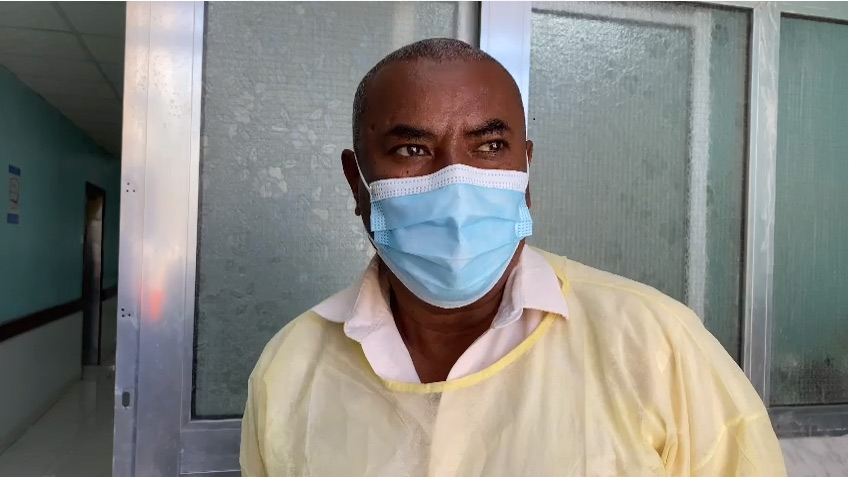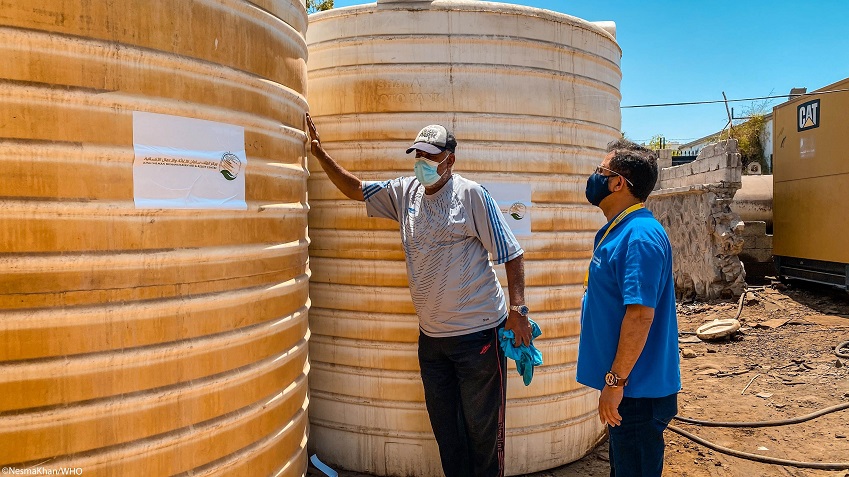20 May 2021 – While Yemen was bearing the brunt of the world’s largest humanitarian crisis, the COVID-19 pandemic further aggravated the crippled health infrastructure. The people of Yemen have been living through long-running armed conflict; threatened by looming famine, disease outbreaks, forced displacement and a shattered economy.
As of 30 April 2021, the number of reported cases of COVID-19 in Yemen was 6294 people and 1222 confirmed deaths. However, health partners remain concerned that the number of cases continue to be underreported due to an array of reasons and that the official epi-curve underestimates the extent of COVID-19 in Yemen.
The crisis in Yemen has not exempt frontline health care personnel. Given that they have to work under extreme adversity and risk their lives while the health system is unable to pay their wages.
22 Hospital in Aden is supported by WHO and the King Salman Humanitarian Aid and Relief Centre (KSrelief). Ahmed Hassan works as a nurse in the intensive care unit (ICU). He works directly with COVID-19 patients and risks his life daily. “The community is not certain that COVID-19 is a true threat. They may not be aware of the dangers it poses on the lives of people, especially the most vulnerable, including the elderly and those with underlying chronic diseases. The situation we face in hospitals is dire,” says Ahmed.
 Ahmed Hassan works as a nurse in the ICU at 22 Hospital in Aden supported by WHO and KSrelief
Ahmed Hassan works as a nurse in the ICU at 22 Hospital in Aden supported by WHO and KSrelief
WHO and KSrelief easing the burdens of the people in Yemen
WHO and partners have been leading the response to COVID-19 in Yemen to avoid a public health catastrophe. Funding from KSrelief has been a critical contribution to the COVID-19 response. Efforts through the COVID-19 project aim to help prevent further spreading of the disease and to mitigate morbidity and mortality by way of expanding pandemic preparedness, early detection of cases, as well as through mounting appropriate control and public health containment measures.
Based on the Yemen Preparedness and Response Plan, efforts aim to fill critical gaps in 28 dedicated health facilities that manage severe cases of COVID-19 through providing personal protective equipment, medical equipment and consumables. In addition to supporting 10 laboratories with PCR testing capacity, enhanced surveillance through points of entry and rapid response teams.
The COVID-19 response also supports capacity-building of the health staff to ensure that quality services are provided in supported hospitals. WHO carried out case management training for 90 technicians and 500 health care workers in targeted health facilities.
“Thanks to WHO and KSrelief for the unremitting efforts. The critical aid they provide includes 20 000 litres of fuel per month to keep the hospital functional, around 300 oxygen cylinders per month, a daily average of 20 000 litres of safe water, medical supplies, laboratory supplies and equipment, including recently an x-Ray machine. Not to mention COVID-19 supplies,” says Dr Nasser Harharah, Director of 22 May hospital in Aden governorate.
 The continued fuel support to 22 May hospital in Aden is vital for the functionality of the hospital and service availability that benefit those who need them the most
The continued fuel support to 22 May hospital in Aden is vital for the functionality of the hospital and service availability that benefit those who need them the most
The pressure the hospital is forced to undertake is significant, and more needs to be provided. “The ICU is operational 24/7 and further COVID-19 supplies, including PPE, is needed to protect the health team,” Dr Nasser adds.
Anees is a health worker at 22 May hospital. He is one of thousands of health personnel across Yemen working under the burden of the conflict and disease outbreaks. “This hospital is the biggest public hospital in the area, and the only one in a large circumference that provides specialized care. Continued support is critical for the functionality of this hospital,” he says.
KSrelief has been the main funding partner of WHO Yemen since 2016. Through the partnership, and in coordination with local authorities, we have been responding to Yemen’s most urgent needs and sustaining the health system; preventing it from total collapse.


